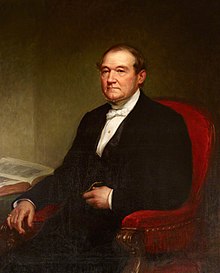William Backhouse Astor
William Backhouse Astor (born September 19, 1792 in New York City , † November 24, 1875 there ) was an American businessman. He was the son and heir of Johann Jakob Astor .
Life
William was born in New York City and studied at Columbia University and Georg August University . There he joined the Curonia Goettingensis . He inherited the huge fortune of his father Johann Jakob Astor and that of his uncle Henry Astor, who died childless . That made him the richest man in the United States at the time. During the Civil War , he successfully sued an income tax law of the American federal government. As a result, the fortunes of the Astor real estate soared. In the end, it was valued at approximately $ 50 million, a huge fortune at the time. Around that time, the Astor empire was divided between his sons William Backhouse Astor junior and John Jacob Astor III . Both operated hotels in the immediate vicinity in the center of New York, which they later combined to form the first Waldorf Astoria Hotel . After the hotel was closed in 1929, the Empire State Building was built on the same site .
William B. Astor married Margaret Rebecca Armstrong (1800–1872) in New York in 1818. They had seven children:
- Emily Astor (1819–1841), married Samuel Ward, Jr. (1814–1884)
- John Jacob Astor III (1822–1890), married Charlotte Augusta Gibbs (1822–1887) in 1846
- Laura Eugenia Astor (1824–1902), married Franklin Hughes Delano (1813–1893) in 1844
- Mary Alida Astor (1823-1881), married John Carey (1821-1881) in 1850; the grandson was Louis Zborowski
- William Backhouse Astor, Jr. (1829-1892), married Caroline Webster Schermerhorn (1830-1908) in 1853
- Henry Astor (1830–1918), married Malvina Dinehart (1845–?) In 1871
- Sarah Astor (1832–1832), died as an infant
Web links
- Astor, Wilhelm Backhouse - page 400 in: Dictionary of American Biography. Edited by Allen Johnson. Volume 1. Publisher: C. Scribner's Sons New York, 1943
literature
- Hans-Dieter Handrack : From Curonen to America's richest man , in: Yearbook of Baltic Germanism LIII, Lüneburg 2005, pp. 217–222
| personal data | |
|---|---|
| SURNAME | Astor, William Backhouse |
| BRIEF DESCRIPTION | American businessman |
| DATE OF BIRTH | September 19, 1792 |
| PLACE OF BIRTH | New York City |
| DATE OF DEATH | November 24, 1875 |
| Place of death | New York City |

